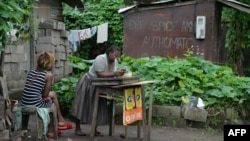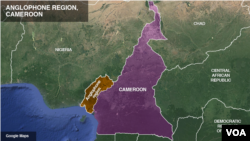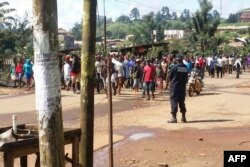Tensions continue to climb in Cameroon’s two English-speaking regions, following the arrest of as many as 11 separatist leaders earlier this month in neighboring Nigeria.
Panic gripped the residents of several towns in Cameroon’s anglophone southwest Monday, as separatist groups vow to keep up the pressure for the release of their leaders detained in Nigeria.
The southwest capital of Buea was abuzz with reports that unidentified armed men were attacking schools and had reportedly kidnapped two traders. The confusion spread to Muea, Muyuka, Kumba and other towns in the southwest.
VOA could find no eyewitnesses to any alleged violence. No security officials have confirmed the reports of attacks, but panic ensued nonetheless.
VOA met textile trader Anne Mankaa early Tuesday at the main market in Buea. The city was quiet, but she and several other traders had decided to keep their shops closed.
"It was a terrible day. Everybody was running to every direction. I first of all locked myself in my shop, but the shouting and running made me to change my mind. I trekked through the bush to my house," she said.
Buea Mayor Ekema Patrick blames rumors for the panic.
"We have been moving around to assure the parents that life has regained its normalcy within the municipality," said Patrick.
At the Government Bilingual Grammar school Molyko in Buea, school teacher Emmanuel Amin said barely 20 percent of his students had returned to class Tuesday.
"Today as we speak, we have 71 students. All our teachers are in place. Maybe we will have more students coming in," said Amin.
Southwest regional Governor Bernard Okalia Bilai says secessionist groups are trying to manipulate the public.
"We should remain vigilant. Parents should continue to protect their children and allow them to go to schools. The children have already suffered last year. It should not happen again this year. Security measures have been put in place to protect the entire population and all their activities," said the governor.
The anglophone crisis began in November 2016, when teachers and lawyers in Cameroon's two English-speaking regions went on strike. The strike devolved into violent unrest and stalemate, shuttering schools for a year. Meanwhile, separatist groups emerged calling for the two anglophone regions to break away.
In October, the secessionist groups declared a new state they call “Ambazonia.” The declaration sparked deadly unrest, and there have since been several clashes in Cameroon between suspected separatists and the military.
The so-called president of "Ambazonia" and at least eight other people were arrested January 5th in Nigeria.
The separatists have declared a curfew three days a week for residents of the southwest and northwest until their leaders are freed.
In a news release emailed to new agencies Tuesday, a group identifying itself as the interim government of "Ambazonia" said Nigerian authorities are keeping 11 of their leaders detained incommunicado, without access to lawyers or relatives.
Amnesty International has expressed concern the detainees could face “torture and unfair trials if extradited from Nigeria.” The government of Cameroon has declined to comment on the arrests.






